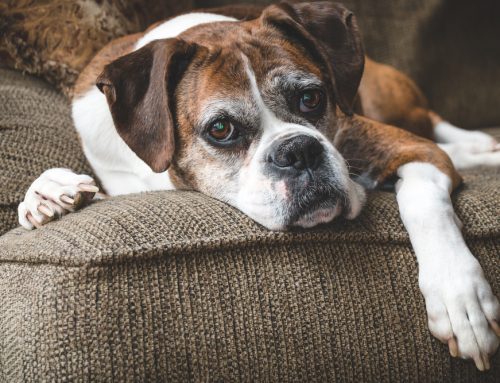Some pets are unaffected by their owner’s comings and goings, while others become significantly distressed when their human is not by their side. A pet who is affected by separation anxiety can experience extreme emotional upset akin to panic, which can be extremely stressful for you and your pet. Our team at Palmer Veterinary Clinic sat in on a support group for pets suffering from separation anxiety, to offer tips on helping these troubled pets.
Precious the calico cat: “Being home all alone is so hard! To distract myself, I became obsessed with grooming, and my hair started coming out in patches. My owner became alarmed, and took me for a visit at Palmer Veterinary Clinic to determine if I was sick.”
Palmer Veterinary Clinic (PVC): Cats affected by separation anxiety will exhibit signs such as overgrooming, elimination outside the litter box, aggression, and decreased appetite. If your pet is displaying inappropriate behavior, you should have them evaluated by a veterinary professional to ensure a medical issue is not to blame.
Conrad the Chihuahua: “I follow my owner everywhere. I get nervous if he goes into another room where I can’t see him, and I start howling so he will come back to save me.”
PVC: The first step in treating separation anxiety is to start independence training, to teach your pet how to be alone. Create a comfortable space in your home, such as a crate or a small, interior room where you place their bed and a few favorite toys. Teach them a “Stay” command, and provide a treat when they comply. Once they have mastered “staying,” start taking steps away from them, offering a treat after several minutes. You can gradually increase your distance, and eventually leave the room. Once your pet stays calm when you leave the room, you can gradually increase the time you leave them alone. Providing a food-puzzle toy for these practice sessions will offer a pleasant distraction.
Tammy the tabby cat: “When my owner is away, I have nothing to do. I usually spend my time clawing the furniture, but for some reason, my human gets upset about this.”
PVC: If your pet depends on you for stimulation, they likely become bored when you leave home, so use environmental enrichment techniques to keep them mentally and physically engaged. Ensure your cat has several scratching posts throughout the house so they won’t be tempted to scratch your furniture. Cats enjoy viewing their environment from an elevated position, so provide a cat tree in a convenient location. You can also leave the television or radio playing, to provide background noise.
Spud the basset hound: “I know when my owner is preparing to leave me alone. She puts her shoes on, puts her purse on her shoulder, and turns the lights off. Before she leaves the house, I am an anxious mess.”
PVC: Your pet knows your departure cues, and will start exhibiting anxiety signs when they see you performing these tasks. To desensitize your pet to these departure cues, perform these actions several times a day without leaving. Once they remain calm when you carry out these tasks, leave the house for a minute, and then come back. You can gradually increase the time you are gone.
Arnold the Maine Coone: “My owner obviously finds leaving me stressful, because she tells me over and over that “Everything will be OK,” but I can still tell she is upset. When she comes home, she spends the first several minutes telling me how much she missed me, so I feel justified in feeling anxious when she’s gone.”
PVC: Creating emotional displays when you leave and return home can feed your pet’s anxiety. They read the drama as excessive emotion that is cause for stress. Keep your departures and arrivals low-key. Give your pet a food-puzzle toy a few minutes before you leave, and quietly make your departure while they are preoccupied. When you come home, wait 15 minutes before greeting your pet.
Ernie the dachshund: “I feel so lonely and sad when my owner leaves. I try to be a good boy, but when I feel so upset, the only way to decrease my stress is to chew on my owner’s most expensive shoes.”
PCC: Pets are instinctively social animals, and find being alone unnatural. When they exhibit behaviors, such as chewing your shoes or scratching at the door, they are not being spiteful, but expressing their distress. Break up your pet’s day by having a friend or pet sitter come by once or twice while you are gone to offer playtime. You can also consider leaving your dog at a doggy day care a few times a week.

Eliza the miniature poodle: “When my owner leaves, I get so distraught. My heart rate increases, I start panting, I howl constantly, and I try to scratch my way out the door. Please come back!”
PVC: If your pet is severely affected by separation anxiety, an anti-anxiety medication may help. These medications are not meant to sedate your pet or alter their personality, but to help your pet relax during your absence.
Some pets require expert behavioral counseling to help overcome separation anxiety. If your pet is suffering from this disturbing problem, do not hesitate to contact our team at Palmer Veterinary Clinic, and schedule an appointment, so we can help before the situation becomes more serious.








Leave A Comment